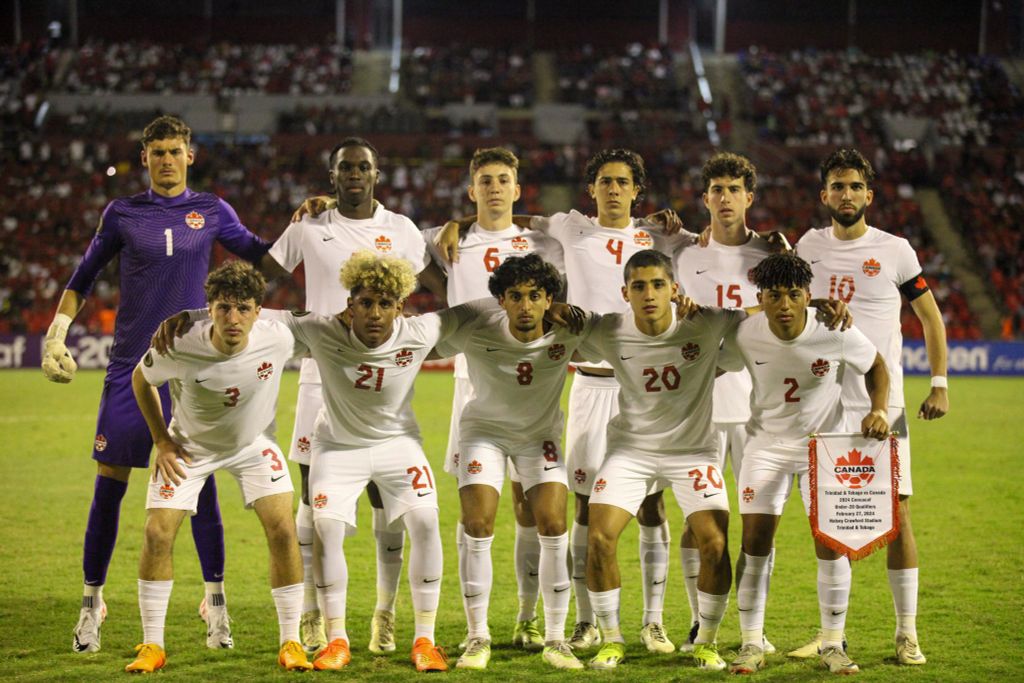PREVIEW: Everything you need to know about the CanM20's ahead of 2024 U20 Concacaf Championships

The U20 Men’s Concacaf Championships are set to kick off this week down in Mexico, where 12 teams are vying to earn one of four coveted spots at the 2025 U20 World Cup, along with a trophy for the winner.
One of those teams is Canada, who are both looking to snap a 17-year drought from the U20 World Cup, having last participated in 2007 when they were hosts, while also trying to win their first U20 men’s Concacaf title in 28 years, having last won in 1996.
If they’re to accomplish that, however, some stiff competition awaits them this tournament, as they play teams with all sorts of pedigree at the youth level, having had a history of success at this tournament and developing players. There’s no better example of that than the group they were drawn into, which features Honduras, El Salvador and the Dominican Republic, all of whom have been at a U20 World Cup more recently than Canada.
Despite that, this Canadian side feels they’re trending in the right direction heading into this tournament. Armed with several players who already have professional experience, including several who were with Canada’s U17 team during the last cycle, they’ve done well in building up a team that should be well-equipped to break that World Cup drought.
And that would be massive. While youth dominance isn’t linked to success at the senior level, something Canada will know well given how their senior team has done over the last half-decade despite their struggles at the youth level, a strong youth program can be a way to create depth and support the senior team long-term.
Ahead of a crucial period for the senior team, tournaments like this are crucial, as there will be several players from this Canadian U20 side who will look to break into the first team for the 2026 World Cup and beyond.
Being able to experience a U20 World Cup would be key in helping them to do that, showing why Canada will be eager to push to be among the four Concacaf teams heading to Chile next summer.
The results are in!#CANM20 will take on Honduras 🇭🇳, Dominican Republic 🇩🇴, and El Salvador 🇸🇻 at the 2024 Concacaf U-20 Championship in Mexico
— Canada Soccer (@CanadaSoccerEN) April 11, 2024
Before they do that, however, they’ll need a strong showing down in Mexico over the next few weeks. Speaking of, here’s what you need to know about Canada’s participation in this tournament, and what tHey’ll need to do to make that World Cup dream a reality.
Can Canada finally break their U20 World Cup drought?
Looking back at Canada’s last U20 World Cup squad is quite the trip down memory lane, as names such as Asmir Begovic, David Edgar, Marcus Haber, Will Johnson and Tosaint Ricketts are some of those who pop up when looking at the squad. 
Then, when looking at the other rosters of teams in the tournament, names like Alexis Sánchez, Arturo Vidal, Marcelo, Sergio Agüero, Ángel Di María, Gerard Piqué, Juan Mata, Edinson Cavani, Luis Suárez, Javier Hernández, Rui Patrício and Shinji Kagawa are a few of the names that some might recognize.
Seeing that a lot of those names have since retired (or are close to it) after excellent careers, which have included World Cup and UEFA Champions League titles, among many other trophies, shows how much has happened in the 17 years since Canada has last played at a World Cup and why they must qualify for the 2025 edition.
Especially given the strides that Canada has made with their senior team as of late, which has gone from a side toiling away as a middling Concacaf side to one of the best in the region, there’s no reason why they can’t be among the four sides from Concacaf that will head to that U20 World Cup next year.
For what it’s worth, however, some factors suggest Canada could be in a good position to end that drought.
First, there’s the growth of the CPL, which is giving more young Canadians a chance to play professionally closer to home, creating more opportunities for players to stay in the game instead of retiring earlier.
Then, there’s the creation of MLS Next Pro, which is helping more Canadians at MLS clubs get professional minutes while creating a pipeline for them to play in MLS down the road, which is benefitting several young Canadians at the moment.
Lastly, there’s the reality that Canada’s success at the senior team level is opening the doors for more dual nationals to want to consider playing for Canada, especially at the youth level where there’s more freedom for movement, which is a key factor.
No doubt, Canada has lots of work to do to strengthen their youth National Teams long-term, as they need more camps and games together, but it’s a good start, and it’s hoped that it’s the start of the growth that’s still to come.
Because of that, this tournament is going to be interesting for Canada. On paper, this seems to be one of Canada’s best chances to reach the U20 World Cup in recent years, but it’s a different beast to actually make it happen, and they’ll know that.
Tweaked format offers room for optimism:
A big reason for optimism for Canada as they look to end their World Cup drought? The format of this tournament, which offers good odds to each of the 12 participants to reach the final four and snatch one of the World Cup spots on offer.
Split into three groups of four, the top two teams from each group and the top two third-place teams will advance to the quarter-finals, where they’ll have to win that match-up to secure a World Cup spot.
Compared to the 2022 tournament, where 20 teams were vying for those four spots, the smaller field will benefit Canada, especially in this format, as they could theoretically reach the knockout rounds with just one group stage win. Of course, they’ll want to ensure they try to top their group, giving them an easier quarter-final matchup, but this format does give them more leeway if they drop points early.
Plus, it’s worth noting that this Canadian side enters this tournament having already been battle-tested together earlier this year, too, as they were put through a tough qualifying process to get here as part of the tweaked format. Having started this cycle outside of the top six in Concacaf’s U20 rankings, they were forced to enter qualifying with the 26 other teams outside of that top six, as the top six were exempt and given a bye to the final tournament.
Canada navigated that challenge with ease, to be fair, topping their group with three wins by a combined score of 15-0, but they were made to work for it and weren’t assured of qualification until their last game, a 3-0 win over Trinidad & Tobago.
Now, they’ll hope that experience can help them as they drop into a tournament with 11 of Concacaf’s best, as some might wonder if that extra preparation time could’ve been beneficial for a Canadian side that might have otherwise been unlikely to have a camp together.
Armed with that extra preparation and the chemistry they’ll have gained from it, they’ll hope that can give them a key leg up in this tournament, one that will feel like a quick sprint given how quickly the do-or-die matches will come around. 
Diving into Canada’s squad and who to watch:
Speaking of Canada’s squad, here’s a look at who they’ve called up for this tournament, as they’ve leaned on several names who helped them in qualifying, along with some key new faces.
There, they’ve got plenty of players to keep an eye on across the squad, including four CPL players, four who have made first-team debuts for MLS teams, several others in MLS Next Pro and a handful of players in Europe.
#CANM20 Squad announced for 2024 Concacaf U-20 Championship 🍁
— CANMNT (@CANMNT_Official) July 11, 2024
Canada will face Honduras on 20 July, Dominican Republic on 23 July and El Salvador on 26 July in Irapuato, Mexico.
Semi-Finalists at the tournament will qualify for the 2025 U-20 FIFA World Cup in Chile.
In goal, a name to watch is Grégoire Swiderski, who was recently called up to Canada’s senior team as a training goalkeeper, as he’s a promising youngster in the Bordeaux system. Having played three matches for the U20s this year, he’ll be expected to carry the load in net this tournament, showing why he’s a highly regarded player in France.
Moving up the pitch, Toronto FC’s Adam Pearlman is a name to watch at centre back, as he has over 60 games of experience in MLS Next Pro, along with one match in MLS having made his debut last year. One of the older players on this team, he’ll look to bring that experience into this team, giving them a rock to rely on at the back.
Meanwhile, in midfield, a few different names stand out.
For example, Whitecaps II midfielder Jeevan Badwal will look to shine after a strong U17 World Cup, especially after recently making his first-team Whitecaps debut, and the same goes for his fellow U17 teammate, Alessandro Biello, who has impressed enough for CF Montréal to make his MLS debut this year. Along with someone like Forge’s Khadim Kane, who brings over 20+ games with the four-time CPL champions, and that gives this side plenty of experience in the middle of the park.
Moving up the pitch, Jessé Costa will look to pull the strings as an attacking midfielder, as the Wolfsburg academy product is the lone returnee from the 2022 U20 tournament, and will look to use his experience from that tournament to his advantage.
And up front, Costa will have no shortage of options to try and find - Kimani Stewart-Baynes has first-team MLS experience with the Colorado Rapids, Santiago López was one of Canada’s big standouts in qualifying and has Liga MX experience with Pumas, Myles Morgan has shown in qualifiers and for the Whitecaps II that he can score in bunches, while the trio of Oumar Diallo (LASK), Tavio Ciccarrelli (HFX Wanderers FC) and Mataeo Bunbury (Portland Timbers II) all offer intrigue for differing reasons, as Canada has players who can score.
What a hit from Santiago López, as he slams one home from a tight angle after a nice ball from Alessandro Biello
— Alexandre Gangué-Ruzic (@AlexGangueRuzic) February 28, 2024
Thanks to this, the #CanM20's now lead T&T 2-0, all but putting them in the U20 Concacaf Championships
Huge camp for López continuespic.twitter.com/AM9j6nLPVI
A squad with pro experience across the board, they have the tools to do what they’ll need to win in tournament soccer, which is to defend resolutely and score goals, the latter of which Canada struggled to do in the last U20 cycle.
Now, they’ll look to put that into practice, starting with their opening match against Honduras on July 20th, and then continue that into the rest of their matches against the Dominican Republic on July 23rd and El Salvador on July 26th.
From there, they’ll hope to be still alive by the time the quarter-finals are played on the 30th and 31st of July, where they’ll look to snap that U20 World Cup drought and then push for a trophy from there, helping put the struggles of past tournaments behind them.

